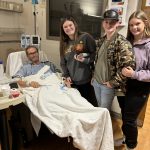Donating Life – Panola residents thankful for organ donations
Published 8:59 am Wednesday, April 9, 2025


By Galen Holley
The gift of life is unlike any other, and local transplant recipients want the public to remember it during National Donate LIfe Month.
“I’m forever grateful to the family who lost their loved one,” said Daniel Cole, who received a liver in November of 2024. Thanks to the transplant, Cole, 50, is back on the job as director of the Emergency Management Agency in Panola County.
Danette Smith echoed Cole’s gratitude.
“The man from whom I received my liver was not a selfish man, he was a giving man,” said an emotional Smith.
The City of Batesville will celebrate Blue and Green Day on April 11. Folks can enjoy food trucks and guest speakers on the downtown square. They can also learn about the organ donation process and find out ways to help.
The festivities will take place from 10 a.m. until 2 p.m. The Mid-South Transplant Foundation will have a tent set up, and Mississippi Blood Services will have a mobile unit there. Blue and Green Day is a national observance to raise awareness about organ donation.
Contrary to popular misconceptions, donating organs isn’t a worrisome ordeal. It’s an easy, loving way to turn sorrow into joy, according to Smith.
Nobody likes to think about dying, but donating organs is a generous and sensible way to save lives, and that’s especially true in the South.
The statistics are overwhelming. “One hundred-thousand people are awaiting life saving organs nationwide, and 4,000 of those are in the Mid South,” said Smith. According to numbers from the non-profit Mississippi Organ Recovery Association, 17 Americans die each day waiting for a transplant.
Mississippians are wearing out their organs at an alarmingly high rate, mostly due to obesity and sedentary lifestyles. High blood pressure and uncontrolled diabetes are maladies that place many in the Magnolia State in need of new kidneys.
Fatty liver disease, caused mostly by diets loaded with fried foods, is also a problem. Factors completely unrelated to alcohol consumption lead to liver disease in many Mississippians.
Cole and Smith are among those unfortunates who have lived through the struggles which result from unhealthy livers.
“It began with swelling and fluid retention in my lower body,” said Cole.
Doctors sent him to cardiac and gastrological specialists before they discovered the real problem. Cole was accustomed to working 70-hour weeks, but he had to scale that way back. It was a hard pill to swallow for a man proud in his work and dedicated to helping others.
It was similar for Smith. Her maladies stretched back to 2016. She was a singer and an avid jogger, but she started running a constant fever. As the years passed and doctor’s visits piled up, she felt worse and worse.
She was diagnosed with Stills Disease and later with Wilson’s Disease, a rare autoimmune disorder characterized by a buildup of copper in the liver.
“My ammonia levels got so high that I couldn’t take care of myself,” said Smith, a wife and mother.Like Cole, Smith simply couldn’t put one foot in front of the other, despite her eagerness to work.
Both Cole and Smith struggled in their personal and professional lives as their liver problems worsened.
Once diagnosed with non-alcoholic cirrhosis, Cole made four trips or “dry runs” as he called them, to the University of Alabama Birmingham in hopes of getting a transplant. He went through the procedure each time, prepping for surgery, often during the wee hours. His prayers were answered in late November of 2024.
In 2021 Smith spent four months on a ventilator. She was on death’s door. At home, her mother took very good care of her, Smith said, noting that a strong support system is one of the important factors medical personnel consider when deciding who receives a transplant.
Her health went up and down. On Jan 22 Smith went into the hospital and four days later received her liver.
She was in the hospital about four weeks, but she made it home, into her mother’s loving care, and she has improved 100 percent. “I haven’t had one hiccup since,” said Smith. “I’m going to do everything I can to take care of my liver.” She even got her singing voice back.
Cole was equally grateful. “The best I can describe it, is like walking into a room, and someone turning on a light switch,” he said, describing the way in which his quality of life has improved.
Like Cole, Smith is a devoted Christian, and she drew parallels between Jesus’ sacrifice, as recounted in the biblical New Testament, and the selflessness of organ donation. “Jesus died on the cross for my sins, and that man, a 46 year-old manGeorgia, gave me the gift of life,” said Smith. “That man died, but he donated, and I lived.”
In order to give back, Smith serves as ambassador for the Mid South Transplant Association, where she visits high schools to educate about the transplant process.
She also serves as ambassador for Methodist University Transplant Center, where she provides counseling, from first-hand-experience, to patients before and after transplant surgery. Smith also sets up tents at health fairs to encourage people to become organ donors. She also volunteers with the Global Liver Institute.
Katie Azar, director of Batesville Main Street Association, said that Blue and Green Day will offer a great community opportunity.
“The donation of organs and tissues gives HOPE and a second chance at life,” said Azar. “ Our community has been deeply touched by organ donation, and we are honored to celebrate recipients and the families of loved ones who have given the sacred gift of life for others.”
Federal law requires hospitals to let the families of potential donors know about organ donation. That includes eye and tissue donations. Across the country, 56 organ procurement agencies are working in their designated service areas to accomplish this. MORA is the federally- designated organ procurement organization (OPO) for most of Mississippi,
To learn about organ donation visit OrganDonor.gov Donate Life America, and UNOS (United Network of Organ Sharing) all of which offer comprehensive information on the donation process, statistics, and how to register as a donor.







